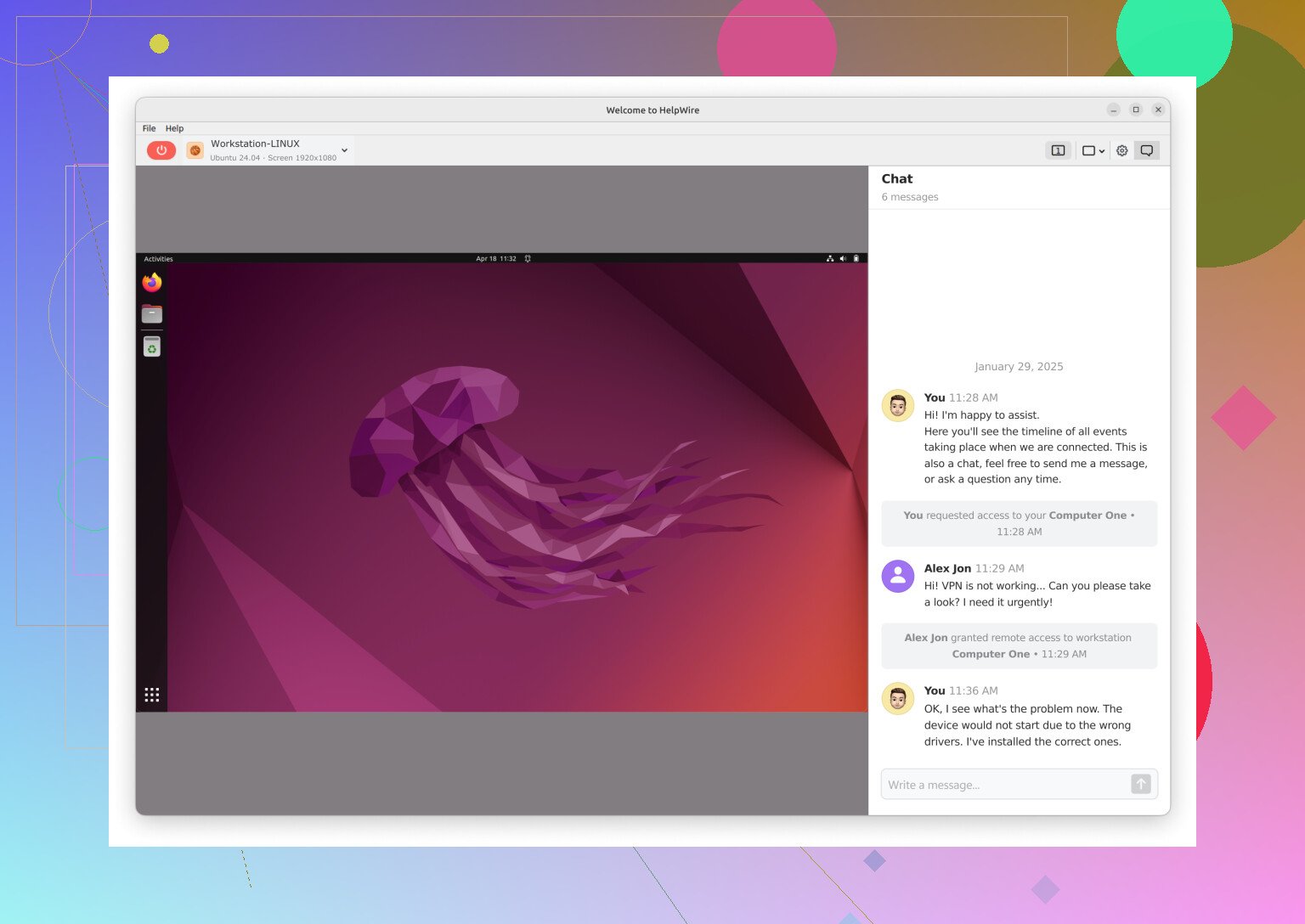I’m looking for recommendations on secure and reliable remote desktop apps specifically for financial services firms. Our team needs to access sensitive client information remotely while staying compliant with industry regulations. We’ve tried a couple of basic tools, but they didn’t meet our security standards. Would appreciate suggestions or insights from anyone with experience in this area.
Let’s not mess around when it comes to remote desktop apps for financial services—security’s literally a dealbreaker. Nobody wants to wake up to a compliance nightmare (trust me, the “fun” audit prep memories haunt me). So, from hobbling through implementations for a CPA outfit, here’s my two cents:
HelpWire—cannot overstate this, it’s designed with financial pros in mind. You get top-tier encrypted connections, device authentication, and granular access controls to limit what each staffer can poke around in. Also, it’s got activity logging that won’t send you into spreadsheet hell at audit time. Worth checking their features here: remote access tailored for accountants and finance teams.
BeyondTrust and Citrix Virtual Apps/Desktops—Industry heavyweights. BeyondTrust is big on privileged access, so you get extra protection around sensitive data. Citrix does compliance and multi-factor really well, but expect a steeper learning curve for setup.
TeamViewer Tensor—if you’re running a big operation and want SSO and compliance features for things like SOC2, PCI, HIPAA, and customizable permissions, this is pretty reliable.
Splashtop Business Access Pro—More affordable, easy to set up, solid encryption, SSO, and device-specific permissions. FPS not amazing on huge files, but hey, we’re accountants, not gamers.
Caution: Please skip apps like Chrome Remote Desktop or classic RDP tunneling unless you love risk and want heartburn from your compliance officer. They lack the audit trails and granular controls you’ll need for Dodd-Frank, SOX, or GLBA requirements.
Main things to tick off: End-to-end encryption, role-based access control, compliance reporting, multi-factor authentication, centralized management, and regular security patching. And honestly? Have your IT/security team vet every app against your regulator’s guidance.
Hope that keeps the SEC and your nerves calm. If you want remote desktop for accountants that’s genuinely secure and easy to manage, definitely scope out HelpWire and the other options above—don’t gamble with client data!
I’ll just say it before I burst: everyone obsesses over heavyweight names, but sometimes you need more than the “usual suspects” for top-tier security when trusting your team’s banking and client data to the cloud. @cacadordeestrelas covered HelpWire, BeyondTrust, Citrix, etc., pretty well, but honestly I’ve always found Citrix to be a beast (and not in a good way) if your IT budget or patience isn’t endless—it feels like launching a rocket every time a new user joins. Compliance is great, but chewing up staff hours on training and troubleshooting? Big nope.
For firms handling remote access to financial client data, my two cents is: don’t sleep on VMware Horizon. You get robust MFA, instant-clone desktops for user isolation, and, crucially, granular auditing without giving your compliance manager a nervous breakdown every Q4. It’s more nimble than Citrix, IMHO, but you still have to budget for the licensing. I also feel like people ignore Microsoft’s new Azure Virtual Desktop—yeah, yeah, Microsoft, but their compliance toolkit is strong, and if you’re already living in the M365 orbit, integration is way smoother.
That said, I do think HelpWire is currently punching above its weight for accounting and finance teams. Encryption, device control, detailed audit logs—it does what TeamViewer does, but less bloat and targeted for regulated industries. Might want to check the details for secure remote desktop solutions for accountants and financial pros if you want less DIY and more set-it-and-forget-it.
Slightly disagree with skipping Chrome Remote Desktop entirely—in rare cases, for non-production or demo purposes, it’s fine. But if compliance ever comes out of your paycheck, yeah, avoid it like the plague for live client work.
Takeaway: prioritize role-based access control, solid encryption, reporting for audits (so your weekends aren’t ruined), and honestly don’t stick yourself with legacy RDP or freebie tools unless a lawsuit sounds exciting. Anyone who tells you “it’s all the same” has definitely never run into a real audit.
Anyone else running something weird or less mainstream? Would love to know if there’s a left-field option that beats HelpWire’s targeted features for accountants.
Let’s get real: in financial services, audit logs aren’t optional, and “good enough” encryption is asking for trouble. While the deep dives above touched the Big Four of remote desktop (BeyondTrust, Citrix, VMware Horizon, TeamViewer Tensor), most of them require you to basically hire a wizard to run—or at least, to stay sane managing access rights.
Zooming in on HelpWire: It’s built for the compliance circus of financial work—think banks, CPAs, and advisory shops. You get granular control over exactly who sees what, end-to-end encryption, plus activity tracking so your compliance officer doesn’t have to stalk everyone with spreadsheets. The best bit? It’s not as bloated as some legacy giants, and setup is straightforward enough that your IT department won’t riot.
Cons for HelpWire: It’s a smaller player, so the integration ecosystem isn’t unlimited—if you’ve Frankensteined your stack with exotic tools, check compatibility. Also, it’s less known, so some auditors might give you the side-eye (but solid documentation helps).
Honestly, skipping stuff like Chrome Remote Desktop (except for Sandbox/demos) is wise—one slip-up with weak logging and it’s regulatory pain all the way down. VMware and Azure Virtual Desktop are strong runners, especially if you’re swimming in other MS or VM tools already, but they do bring cost and setup drag.
Summary: If you want remote access without hoping nobody notices the weak spots, HelpWire stands out for financial firms—tight controls, easy audits, not a setup nightmare. Just make sure its features align with your whole tech stack, especially if you’re managing hybrid environments. Anyone using something even more streamlined or niche? Curious to hear from the outliers.

